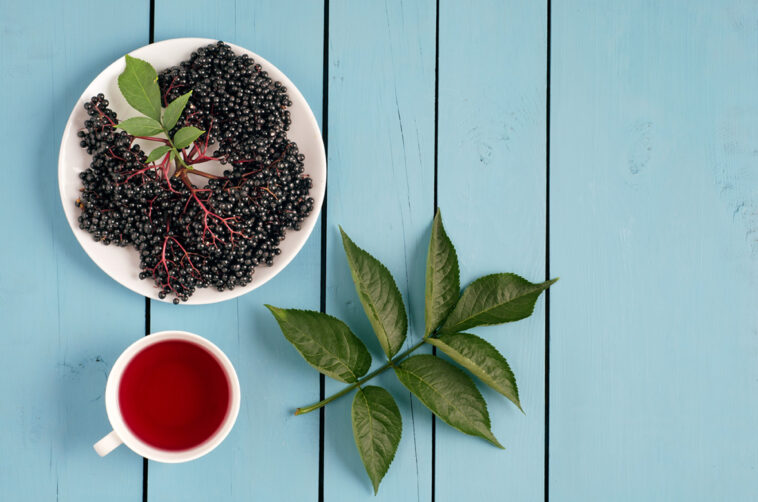One of nature’s most versatile solutions to various ailments is the elderberry, a dark purple berry from the European elder tree. I know you are not getting exactly what I am talking about. Look at this picture. These small berries have big supporters all around the world who insist that the fruit has the power to cure many diseases.
But how true are those claims?
In this article, we will discuss in detail the benefits and side effects of elderberries and will also analyze whether the benefits outweigh the side effects or we should stay away from them to stay safe from any harm.
What Are the Health Benefits of Elderberry?
According to the supporters of elderberry, the fruit and flowers of this plant are packed with vitamins and antioxidants. Hence, it is very effective in boosting the immune system. Moreover, these antioxidants and vitamins help fight inflammation, cardiovascular diseases, and reduce stress. Elderberries are also considered to be a very effective cure for cold and flu.
The most common ailments that are claimed to have been treated with the help of elderberries include:
Joints and muscular pain and inflammation
A number of respiratory disorders
Heart diseases
Kidney problems
Common headaches
Fever
Rheumatism
Epilepsy
Minor skin problems
Chronic constipation
HIV and AIDS
Is Elderberry Really Effective for the Above Mentioned Diseases?
Elderberries have been very effective for treating various ailments according to old wives’ tales and through word of mouth. But there is no science-based research that proves its effectiveness.
Possibly Effective for Cold and Flu
According to a research done in 2004 on a group of 60 influenza patients, 15 ml of elderberry syrup, when taken four times a day, relieved the symptoms of flu in 2 to 4 days.
It has been observed that elderberry syrup can relieve symptoms of cold and flu but only if it is taken soon after the appearance of those symptoms. Hence, doctors and nutritionists advise taking it as a part of healthy nutrition and not as a treatment for respiratory problems.
Evidence for The Effectiveness for The Following Health Conditions
Heart Diseases
No research has proved the benefits of elderberry in treating medical conditions related to the heart.
Cholesterol Levels
There is no evidence to prove that regular or extensive use of elderberry in any form can help maintain healthy cholesterol levels or reduce bad cholesterol.
Maintenance of Blood Sugar Levels
According to a study, it was concluded that elderberry flowers inhibit the enzyme alpha glucosidase and increase insulin secretion. These two qualities lead to reduced blood sugar levels.
Why is Elderberry Considered to be Effective for Various Diseases?
As I have mentioned earlier, elderberry is rich in vitamins and antioxidants that include high concentrations of vitamin C and flavonoids such as anthocyanins. These nutrients are scientifically proven to reduce the level of fat in the blood and decrease bad cholesterol. Similarly, these nutrients also improve heart health and decrease blood pressure. Another significant role played by foods that are rich in such nutrients is the improvement in blood sugar levels and a better maintenance of the serum level of uric acid.
When we eat food that provides these health benefits to our body, the organ systems in the human body start reacting positively. For example, management of blood sugar level and uric acid is important for a better heart health. As elderberry is a fruit and the dosage of the nutrients it provides is hard to keep as much as required, it is more commonly recommended to be used as a health supplement rather than a treatment. Another reason is that everybody reacts differently to different foods and no one amount of food is suitable for everyone.
Side Effects of Elderberry
Where many potential health benefits are being associated with the use of elderberries, some risks are also linked with its consumption. Unripe berries, the bark of the tree, and seeds contain a substance known as lectin. High intake of this substance may cause stomach problems. Moreover, the elderberry plant also contains cyanogenic glycosides and can release cyanide which is a toxin.
Precautions for Using Elderberries
The best and the safest method of the consumption of elderberries is in the form of health supplements. These commercial preparations and also the cooked berries do not contain cyanide. Hence, no risks are associated with their consumption. These supplements are present in the form of elderberry capsules offered by brands such as Herbal Roots, elderberry extracts, and GMO-Free elderberry gummies by brands such as Nature Made and Gummies Garden.
Elderberry is safe for children over 12 years of age but children younger than 12 years should avoid using it as there is no evidence of its safety at this age.
In addition, pregnant and lactating mothers should also avoid taking elderberries to stay on the safer side as no scientific research is done for the safety of elderberry consumption by pregnant and breastfeeding women.




Comments